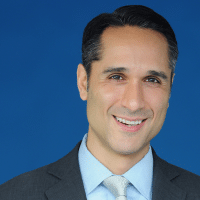Navid Dayzad was about 5 years old when he overheard his mother and grandmother, with whom he’d recently immigrated to the U.S. from Iran, talking in the kitchen. It was during the Carter administration, when the American government openly discussed the idea of deporting all Iranians as retaliation for the hostage crisis.
“I remember very vividly my mom pondering out loud with my grandmother, on a very practical level, which of our neighbors would we leave our belongings with if they come after us?” Dayzad remembers. “I had a deep feeling that I didn’t understand all the legal stuff or what was happening, except that, ‘Wow, immigrant life is not secure.’”
This overheard conversation planted the seed for what Dayzad calls his “destined” path towards becoming an immigration attorney. He applied for and received U.S. citizenship at age 18, then studied psychology at UCLA and law at UC Berkeley.
At first, he practiced employment law as a litigator. But soon, he transitioned to immigration law. He quickly discovered there was a great deal of crossover between the two.
“A large part of my immigration work is representing companies and helping their employees to get work visas in the U.S.,” he says. “I find it more rewarding to advocate for solutions to immigration problems through employment, giving [my clients] a practical solution, like a work visa or green card that will change the lives of them and their families.”
Within immigration law, Dayzad specializes in LGBTQ+ clients. This, he says, has been particularly gratifying.
“There’s a lot of emotions that surround the process for any immigrant, but there are some very unique emotions that surround the process for LGBTQ immigrants,” he says.
One of his clients was a gay man who fled a Middle Eastern country to join his boyfriend in the United States. The client came from a family who was hostile towards the LGBTQ community, and the client had a number of concerns about his immigration application. Among those were whether the application could become public, outing him to his family; and whether his family could somehow have him deported back home, putting his life in danger.
“The answer is, of course, no, they can’t, but I could in an instant understand why a non-immigration attorney would have this fear,” says Dayzad. “So it was a sweet victory when we got his green card, and then when they invited me and my own life partner to celebrate with them at their wedding reception.”
Another client, a British designer, was able to obtain a work visa, then a green card and naturalization, under Dayzad’s guidance. This was years ago, but in early 2024, Dayzad received an email from him saying that his former client had visited President Joe Biden and First Lady Jill Biden at the White House. When the client told the president and first lady his immigration story, the president said, “Thank you for choosing us.”
“This was especially moving because the president had echoed the same sentiment I often tell my clients in a consultation,” says Dayzad. “I tell them, ‘America would be lucky to have you.’”
Recently, Dayzad and other immigration attorneys have their eyes trained on the upcoming presidential election.
“For the last several months and continuing until the election, when counseling clients, I have to follow up my explanation of our legal strategy with a big disclaimer: If there’s a change in president, certain immigration options might become more narrow or limited,” he says.
But in the meantime, he’s focused on what he can do to help. And Dayzad has never forgotten his own story.
“We didn’t get deported, and no neighbor had to come gather our belongings,” he says. “And I’m so grateful I got to flourish in America.”
Read more on SuperLawyers.

